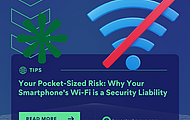Top 5 Mistakes that could give cybercriminals access to your financial information

Online money management is become commonplace in today's digital environment. Our financial data is now more easily available than ever before, whether via online purchasing platforms, budgeting tools, or banking applications. But there are risks associated with this convenience. Cybercriminals are always searching for ways to take advantage of common errors and weaknesses. Being mindful and taking preventative action are necessary to safeguard your financial information. Let's examine the top five errors that could give hackers access to your financial information and how to prevent them.
1. Ignoring Basic Security Practices
Many people underestimate the importance of fundamental cybersecurity practices. For instance, failing to enable two-factor authentication (2FA) leaves your accounts vulnerable to unauthorized access. Similarly, neglecting to update software and apps allows hackers to exploit known vulnerabilities in outdated versions.
Public Wi-Fi networks are another common pitfall. Accessing sensitive financial accounts on unsecured networks can expose your data to eavesdropping. To safeguard your information, always use 2FA, keep your devices updated, and use a trusted VPN when connecting to public networks.
2. Reusing Passwords Across Multiple Accounts
Password reuse is a widespread issue that cybercriminals exploit through "credential stuffing." If one account is breached, attackers can use stolen credentials to access other accounts.
To combat this, create unique passwords for every account. Since memorizing multiple complex passwords is challenging, consider using a reliable password manager. These tools generate and securely store strong passwords, giving you peace of mind.
3. Relying on Third-Party Budgeting Apps Without Precaution
Budgeting apps are convenient for tracking expenses, but they often come with hidden risks. Many apps share user data with third parties or require extensive permissions that can compromise your privacy.
Before using any budgeting app, review its permissions and data-sharing policies. Alternatively, opt for budgeting tools provided by your bank. These tools are typically integrated with your accounts, offering better privacy and security. For example, banks like Wells Fargo, Chase, and Bank of America provide robust expense-tracking features within their secure platforms.
4. Shopping on Unverified Websites
Online shopping is a staple of modern life, but it can expose your financial data if you’re not cautious. Unverified websites may lack strong security measures, leaving your payment information vulnerable to theft.
To shop safely, stick to reputable websites with solid security and privacy policies. Read reviews to identify red flags and use secure payment methods like PayPal or virtual credit cards to add an extra layer of protection.
5. Neglecting to Remove Personal Data from Data Brokers
Data brokers collect and sell your personal information to third parties, including scammers. This can expose you to identity theft and financial fraud.
To reduce your risk, regularly opt out of data broker platforms and use data removal services to scrub your information from these databases. While this won’t eliminate your digital footprint, it can significantly enhance your privacy.
Stay Vigilant to Protect Your Financial Future
The risks of exposing your financial data are significant, but they are also preventable. By avoiding these common mistakes and adopting strong cybersecurity practices, you can safeguard your financial information from cybercriminals. Take action today to protect your finances and secure your digital life.
‹ Back







